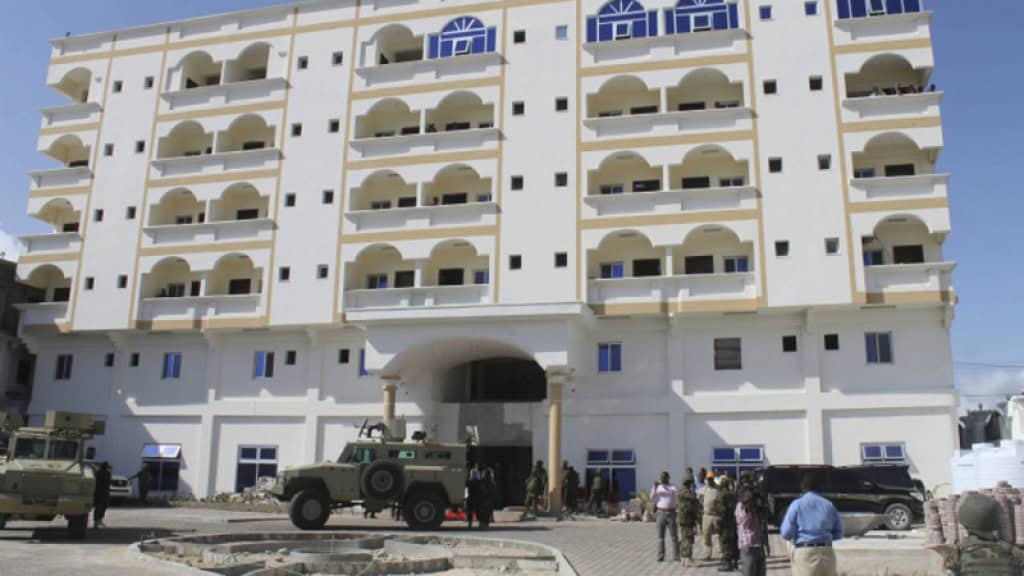The Jazeera hotel in Mogadishu
Shabaab, al Qaeda’s official branch in Somalia, has claimed responsibility for bombing the popular Jazeera hotel in the Somali capital of Mogadishu on Sunday. The blast killed more than 10 people and wounded many others.
According to the BBC, the jihadist group used a truck packed with explosives to target the hotel. A local police officer told Reuters that the truck “rammed the gates of the hotel” before detonating and an aid worker said that at least 21 people were injured in the blast. A Shabaab spokesman told Reuters that the bombing was in response to “attacks and helicopter bombing against al Shabaab by AMISOM and the Somali government.”
AMISOM, or the African Union’s Mission in Somalia, recently forced Shabaab from two of its strongholds in southern Somalia. On July 22, AMISOM and Somali troops drove the jihadist group out of Bardere in the Gedo region. According to Somali media, the town was recaptured without a fight. Two days later, the town of Dinsor in the Bay region was also recaptured by a joint AMISOM-Somali mission. The two missions are part of a larger joint offensive to drive Shabaab out of its remaining strongholds in the country.
The bombing occurred a day after Shabaab assassinated a Somali MP and another official from the prime minister’s office in two separate attacks in Mogadishu.
The Jazeera hotel has been targeted in the past by the jihadist group. In early 2014, Shabaab launched a complex assault on the hotel. Three bombs exploded within an hour of each other, killing 11 people. The first attack occurred when a suicide bomber drove into the gate of the hotel, killing himself and four other people, while the second attack was a car bomb that detonated as first responders rushed to the scene. The third bomb exploded approximately one hour later in a car being searched by the military. [See LWJ report, 2nd Shabaab attack on Mogadishu’s Jazeera hotel.]
In September 2012, the group sent three suicide bombers to attack Somalia’s new president and Kenya’s foreign minister as they were speaking at the hotel. The two officials escaped unhurt, but at least seven people were killed.
Shabaab routinely targets hotels in the Somali capital, as these are often meeting places for government officials and foreigners. On March 27, Shabaab stormed a hotel and briefly seized control of it before the jihadists were killed by security forces. On Feb. 20, a suicide assault team hit the Central Hotel, a gathering place for Somali parliamentarians and members of government, killing several senior Somali politicians. On Jan. 22, Shabaab claimed credit for the bombing at the SYL Hotel in Mogadishu that killed three people. The attack took place as Turkish President Recep Tayyip Erdogan and a delegation were at the hotel.
The hotels sit in one of the most heavily fortified areas of Mogadishu, but the jihadist group retains the ability to strike in high-security zones of the capital. Last year, Shabaab attacked the parliament, the president’s compound, and a high security intelligence headquarters. In June 2013, a Shabaab team struck at the United Nations Development Program (UNDP) compound in Mogadishu; several UNDP employees were killed and the jihadist group briefly took over the compound.
While Shabaab has lost many of its major urban strongholds and areas in the rural south, it still controls large portions of southern Somalia and remains a potent force. The group maintains the capacity to conduct attacks inside Mogadishu and stage major attacks on African Union forces in the country. Shabaab has also increasingly been able to mount large operations into neighboring Kenya.









1 Comment
Shabaab might not have ‘Pledged’ themselves to ISIS/ISIL but they’ve certainly seemed to have
co-opted their tactics if not their whole strategy